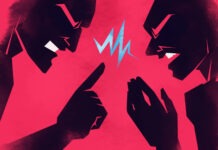So there’s this TV show, right. It’s set in the future, where a nefarious artificial intelligence has essentially conquered Earth with a robot army nuked the planet and forced the last remnants of humanity into a small city. Nope, this isn’t “Terminator.” It’s “Power Rangers RPM,” the last “Power Rangers” season produced by Disney. “RPM” feels like the culmination of everything I’ve been talking about this semester.
It’s a well-told episodic story, the characters are worth caring about and it’s a huge guilty pleasure. Maybe “guilty pleasure” isn’t exactly the right word for it, but it’s definitely for a certain audience. And if you’re in that audience? You’ll dig the hell out of it.
Look, if you’ve never had an affinity for the “Power Rangers” franchise or the Japanese style of “masked hero” shows, I don’t know that “RPM” will do much for you. If you’re the kind of person who can watch “Regular Show” without feeling guilt, that may be enough to make up the difference. But if you’re bridging seasons of “True Detective” with your fifth “Breaking Bad” re-watch, just try “The West Wing” and skip the spandex.
Ever since “Adventure Time,” the idea that a show for the younger set can appeal to older folks has become more widely accepted. There’s a distinction between “fun for all ages” and “this is a kid’s show that somebody dropped a couple sex jokes into,” and “Power Rangers RPM” definitely falls into the former category.
The action is certainly fun – there’s a certain joy in watching a grown man yell out his attack before whacking a giant rubber monster with a sword that looks like a road – but “RPM’s” action holds value beyond the childlike glee of big ol’ lasers. The Green Ranger, Ziggy, is objectively terrible at fighting, so his fighting style is certainly…improvised. Remember those drunken bar fights from “The World’s End?” He fights like that. So you’ve got all these highly choreographed fighters and then one guy wildly flailing about. It’s a creative decision that works better in action than it does on the page.
It’s also got a surprisingly aware sense of humor. There’s a lengthy segment in an episode dedicated to picking apart several tropes unique to the franchise. Why do the robots have giant anime eyes? Why do the Rangers need to yell out a specific phrase when morphing? “RPM” clearly knows what it’s dealing with, and is more concerned with having fun than playing these cliches straight for nostalgia’s sake. In shows like this, deconstruction often comes hand in hand with smugness, but “RPM” appreciates what has come before.
The story is surprisingly well-told for a “Power Rangers” show. Within the first couple episodes, the audience is given all the necessary information. This evil computer virus wants to kill all the people. Here are the main characters and here’s what’s up with them. This is Ziggy. He’s the best. Before the show gets into the business of the actual plot, it dedicates some time to establishing the protagonists.
Once we know who these characters are, the show ties character development and plot together, forming a real story. It succeeds where “House of Cards” failed: Episodes move both characters and plot forward. And characters are prone to failure, which is certainly welcome in a kid’s action show. Of course they defeat the big monster at the end with their giant robot (Quick aside: They actually combine every robot they have into an enormous robot), but that sometimes comes with sacrifice or another personal failure.
The writing also talks up to its audience; like when the show almost outright stated that a government agency kidnapped and brainwashed a young girl or a certain Ranger helped prevent a genocide. There’s no sugarcoating here, and the light, personable dialogue helps prevent the darker elements from dominating the tone. Instead, both elements work together, populating its universe with characters who are absolutely in danger.
Look, “Power Rangers RPM” is a tough sell. But there’s also no getting around it: This show just works. The writing is fun and the action often brought a huge grin to my face. This is old “Power Rangers” filtered through rose-colored glasses and brought into reality. It’s just a damn fine show.
Mike Cosimano is a first-year psychology major. He can be reached at cosimanowhite@oxy.edu or on Twitter @WklyMCosimano.
![]()






































